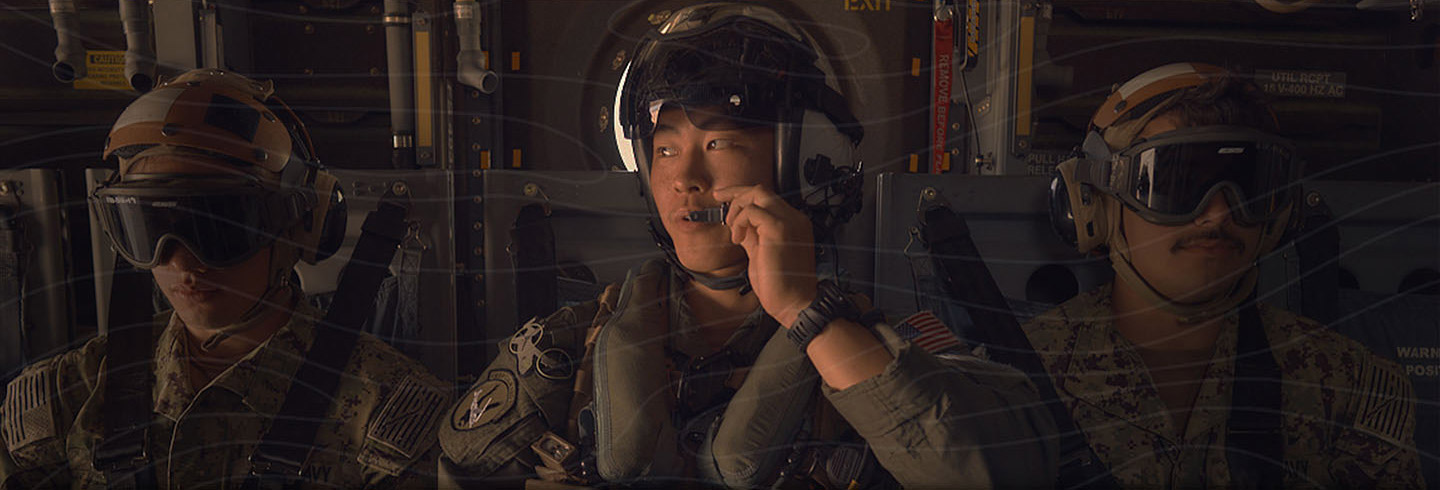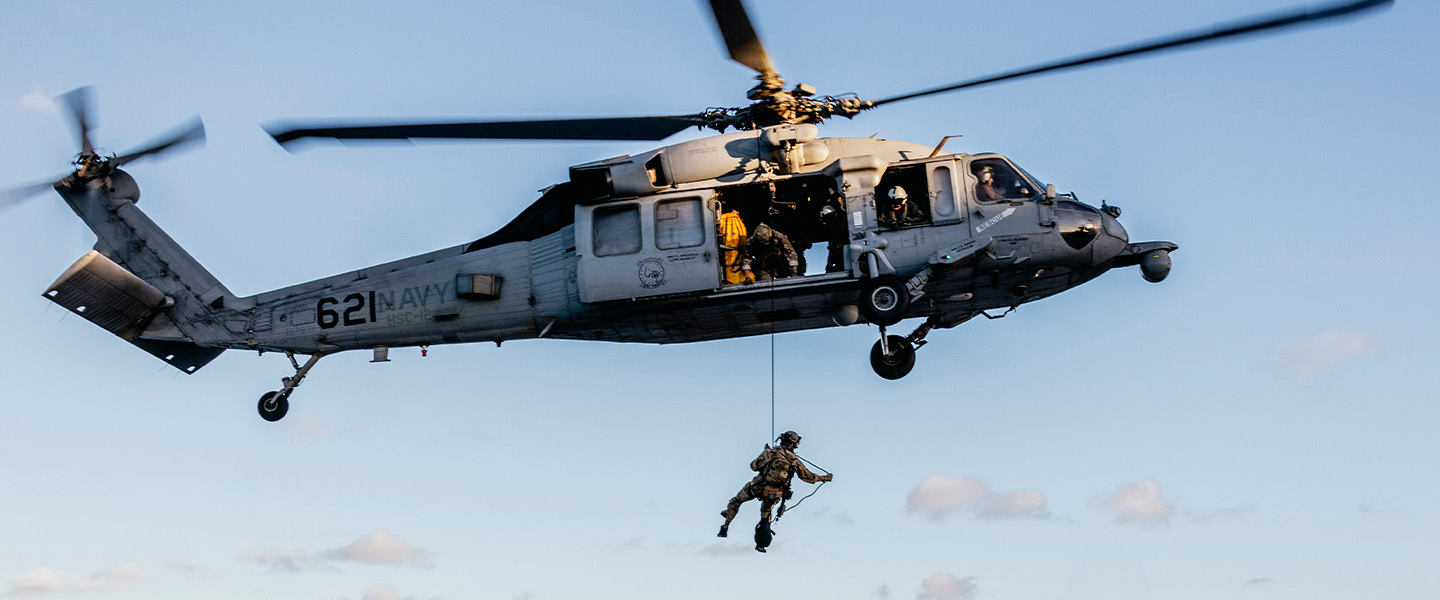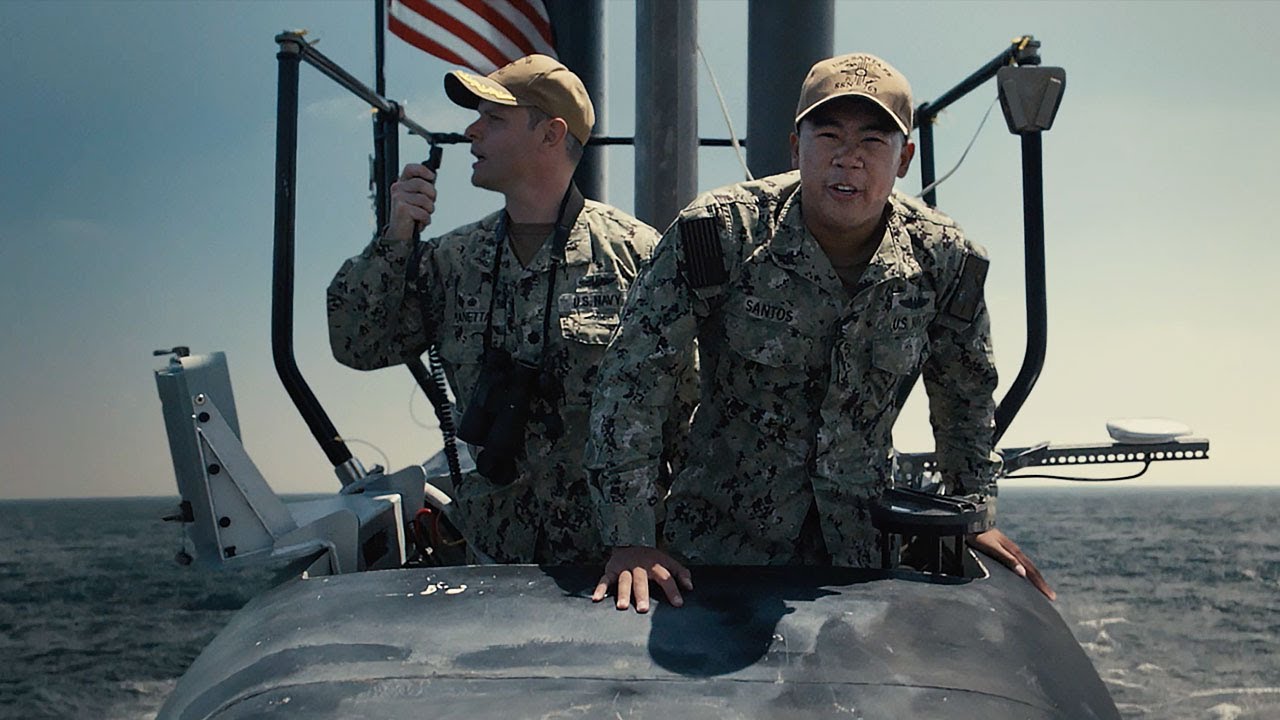Navy Career Quiz
Discover what the Navy has to offer. Whether you want to gain valuable STEM skills, hone your creative talents, or push your physical and mental limits, the Navy has the challenge for you. Take the quiz and discover your potential.

As a Navy EOD Technician, you will have many far-ranging duties that can cast you on missions across the world. Your duties may require you to:
Your unique skills and knowledge will add to the strengths of other Special Operations units, as well as your own. As an EOD Technician, you may also:
Your missions will take you to every corner of the world. One assignment may have you parachuting from 17,000 feet, while the next may deliver you via an 11-meter Rigid Hull Inflatable Boat (RHIB). It all depends on which unit you’re supporting and the type of mission to be completed, as well as the required equipment weight of each team member, weather conditions and other parameters.
,Becoming an EOD Technician is no easy process. While the rigorous 51 weeks of training are both physically and mentally grueling, you will be rewarded with unrivaled leadership opportunities, first-rate compensation and respect.
After two months of recruit training in Great Lakes, IL, your EOD training will begin.
EOD Prep Course of Instruction (3 weeks) – The EOD training pipeline starts with preparatory training in Great Lakes, IL. Candidates work on swim stroke development, long-range swims and physical conditioning.
Diver Training (9 weeks) – Next comes dive school at the Naval Diving and Salvage Training Center (NDSTC) in Panama City, FL. Training covers basic concepts of scuba diving as well as dive physics, physiology and basic dive medicine. Candidates also learn about equipment such as the MK16 underwater rebreather.
EOD School (42 weeks) – After successfully completing dive school, candidates transfer to Naval Explosive Ordnance Disposal School at Eglin Air Force Base in Fort Walton Beach, FL. This training is comes in four sections, each teaching how to render safe or defuse specific types of ordnance.
Air Ordnance Division – Focuses on bombs and missiles
Improvised Explosive Devices (IEDs) – Includes “homemade bombs”
Nuclear Ordnance Division – Covers basic nuclear physics and radiation monitoring and decontamination procedures
Underwater Ordnance Division – Emphasizes torpedoes and other underwater explosives as well as underwater search techniques
Basic Parachute Training (3 weeks) – After completing basic EOD school, graduates attend Basic Airborne Training (“jump school”) at Fort Benning, GA, where they qualify as a basic parachutist.
EOD Tactical Training (3 weeks) – The final phase of training is in San Diego, CA. It teaches helicopter insertion (fast-rope, rappel, cast and special patrol insertion, and extraction rigging), small arms/weapons training, small unit tactics (weapons, self-defense, land navigation and patrolling) and tactical communications (satellite and high frequency).
Upon successful completion the EOD training pipeline, graduates are assigned to EOD Mobile Units where they gain advanced on-the-job training and experience as members of Mobile Teams, Carrier Strike Group/Expeditionary Strike Group Companies, Naval Special Warfare Companies and Marine Mammal Companies.
For those with further leadership aspirations and a college degree, Officer roles are available – providing the opportunity to lead and train others.
Promotion opportunities are regularly available but competitive and based on performance. It’s also important to note that specialized training received and work experience gained in the course of service can lead to valuable credentialing and occupational opportunities in related fields.
,Members of the Naval Special Warfare/Naval Special Operations (NSW/NSO) community have any number of unique opportunities to advance their education. Navy training provides skills and knowledge in everything from the fundamentals of explosive ordnance disposal to chemical and biological warfare, military tactics, deep-sea diving or a number of other tactical military procedures.
Beyond offering access to professional credentials and certifications, Navy training in the EOD community can translate to credit hours toward a bachelor’s or associate degree through the American Council on Education. You may also continue your education through opportunities like:
,Males and females are eligible to apply to become enlisted Navy EOD Technicians. No college degree is required, but a high degree of difficulty and satisfaction is standard. Training is tough and ongoing. You can apply for the Navy Challenge contract for EOD Technicians at any time during your first enlistment.
Entry Requirements
The chart below highlights the current minimum Navy Physical Screening Test (PST) requirements for Navy Challenge Programs.
Additional requirements specific to Active Duty EOD Technician candidates include:
NOTE: You should consult your physician or other health-care professional before starting any exercise regime or other fitness program to determine if it is right for your needs. This is particularly true if you (or your family) have a history of medical illnesses or ailments that could be made worse by a change in physical activity. Do not start a fitness program if your physician or health-care provider advises against it.
General qualifications may vary depending upon whether you’re currently serving, whether you’ve served before or whether you’ve never served before.
There are no part-time jobs available for this career track.
,There are no part-time jobs available for this career track.
,There are no part-time jobs available for this career track.
,There are no part-time jobs available for this career track.
,There are no part-time jobs available for this career track.
Your job as a Navy Diver could encompass many dive specialties, including:
Salvage and recovery – Locating and retrieving wreckage; conducting harbor and waterway clearance, underwater repairs and salvage operations in all environments
Deep submergence – Probing the greatest depths in the name of research and other classified missions
Ship husbandry – Inspecting and repairing ships and submarines
Saturation diving – Working and living at extreme depths for days or weeks at a time
,Fittingly, the Navy Diver motto is “We Dive the World Over.” Members of this Special Operations force travel the world, working everywhere imaginable, in just about every possible undersea environment – from cold, muddy water where underwater tasks can be completed by feel only - to warm, tropical waters clear enough for underwater photography.
,Training to become a Navy Diver challenges your willpower, intelligence and physical strength – and puts your desire to the test. Complete the training, and you’ll rank among the world’s elite underwater adventurers. Training includes:
Diver Preparation Course (7 weeks) at Naval Training Command, Great Lakes, IL, for training in basic electrical and engineering courses, water adaptability and physical fitness
Second Class Dive School (15 weeks) at the Naval Diving and Salvage Training Center (NDSTC) in Panama City, FL, for training in any or all of the following:
Fleet Training – You will be assigned to one of the Navy Diving Units to be trained to perform underwater ship repair, salvage and construction, using either SCUBA equipment or a surface-supplied-air diving system. Training for Diving Medical Officers and Diving Medical Technicians is also part of Fleet training.
Advanced Training – Many experienced divers return to NDSTC for further course work so they can qualify as First Class Divers and Master Divers.
For those with further leadership aspirations and a college degree, Officer roles are available – providing opportunities to lead and train others.
Promotion opportunities are regularly available but competitive and based on performance. It’s also important to note that specialized training received and work experience gained in the course of service can lead to valuable credentialing and occupational opportunities in related fields
,Members of the Naval Special Warfare/Naval Special Operations (NSW/NSO) community have any number of unique opportunities to advance their education. Navy training provides skills and knowledge in everything from military tactics, deep-sea diving and a number of other tactical military procedures.
Beyond offering access to professional credentials and certifications, Navy training in the NSW/NSO community can translate to credit hours toward a bachelor’s or associate degree through the American Council on Education. You may also continue your education through opportunities like the following:
,Males and females are eligible to apply to become Enlisted Navy Divers. No college degree is required, but a high degree of difficulty and satisfaction is standard. Training is tough and ongoing. You can apply for the Navy Challenge contract for Divers at any time during your first enlistment.
Entry Requirements:
Visit the Navy SWCC PST Calculator to review the current minimum Navy Physical Screening Test (PST) requirements for Navy Challenge Programs.
General qualifications may vary depending upon whether you’re currently serving, whether you’ve served before or whether you’ve never served before.
There are no part-time jobs available for this career track.
,There are no part-time jobs available for this career track.
,There are no part-time jobs available for this career track.
,There are no part-time jobs available for this career track.
,There are no part-time jobs available for this career track.
Travel the world to capture military operations, develop high-profile media campaigns and tell the story of America’s Navy.

Navy Musicians perform at special events, celebrations, international parades and more.

Write news releases. Answer reporters' questions. Manage the public image of America’s Navy as a valued Public Affairs Officer.

Control congestion in the skies as an Air Traffic Controller.

Lead the flight deck as an Aircraft Handling Officer.

When you become an Aircrewman Helicopter, you become the eyes and ears of the cockpit.

Become our go-to personnel in the air as an Aircrewman Mechanical.

Detect and engage threats beneath the ocean’s surface as an Aircrewman Operator.

Hunt for lurking submarines from the air as a Tactical Romeo Helicopter Aircrewman.

Manage and direct aircraft launch operations on the flight deck.

Refuel aircraft on the flight deck and keep fuel flowing to all parts of the ship.

Launch and recover aircraft on the flight deck of an aircraft carrier.

Lead flight support teams as an Aviation Maintenance Duty Officer.

Manage your ship’s stock of missiles, mines and other ordnance.

Ready to lead the launch as a Catapult Officer Shooter?

Defend from the sea to the stratosphere as a Navy Fighter Pilot.

Hunt submarines, patrol the skies or supply carriers as a Fixed Wing Pilot.

Track subsurface contacts and perform rescue missions as a Helicopter Pilot.

Uncover threats in the depths of the sea as a Naval Aircrewman Avionics.

Lead flight missions to success as a Naval Flight Officer.

Keep the Navy’s complex aircraft and helicopters in top working order.

Provide meals that keep your fellow Sailors fueled for duty.

Support and assist fellow Sailors by helping guide their career journey.

Keep your ship stocked with the equipment it needs to succeed.

Advance your own career goals while you help fellow Sailors do the same.

Keep your shipmates happy by managing ship store, laundry and barber services.

Oversee logistics and ensure your ship is supplied with everything it needs.

Become an administrative pro by managing the Navy’s paperwork and records.

If you like to solve problems using your hands, you belong with the Builders.

Design and build city-size bases, airfields and harbor facilities.

Kickstart your career with hands-on electrical experience.

Get out of the auto shop and get hands-on mechanical experience.

Start your engineering career with real-world experience as a Navy Seabee.

Work with construction equipment from bulldozers to cranes and everything in between.

Weld metal a world away as a Navy Steelworker.

Keep critical utilities systems up and running no matter where you are in the world.

Maintain and repair the complex electronic systems aboard Navy aircraft.

Use electronic systems like radar to detect threats and make your ship virtually invisible.

Maintain the navigation systems that ensure your submarine reaches its destination.

Maintain the electronic systems controlling a submarine’s vast supply of firepower.

Ready, aim, fire. Maintain ship combat readiness as a Fire Controlman.

Keep vital computer networks up and running aboard ships and submarines.

Keep our comms running smoothly as an Interior Communications Electrician.

Assemble, maintain and repair nuclear-capable ballistic missiles as a Missile Technician.

Keep our Sailors out of harm's way and defend against emergencies as a Damage Controlman.

As a Master-at-Arms, you are the Navy police. Defend by serving and protecting our own.

Keep Navy aircraft at peak performance by maintaining electrical systems and components.

Maintain the engines of the Navy’s most powerful aircraft and helicopters.

Inspect and repair aviation equipment to ensure aircraft are always flight-ready.

Maintain aircraft equipment that sustains life at every altitude.

Perform ground support operations that keep Navy aircraft flying high.

Be the person Navy pilots rely on to keep emergency equipment in top shape.

Perform honored duties as a member of the Navy’s oldest rating.

Keep the power on and the lights running aboard aircraft carriers and ships.

Move the fleet forward as an expert in diesel engine systems.

Operate the electrical systems of powerful turbine engines on Navy warships.

Maintain the mechanical systems behind our powerful turbine engines.

Maintain your ship’s guns and missile launchers, and oversee all weapons on board.

Perform metal work and welding to repair hull breaches and broken equipment.

Repair tools and fabricate parts for machinery and equipment across the ship.

Maintain vital propulsion and auxiliary systems on every inch of the ship.

Maintain the systems that make life possible on a submarine.

Serve aboard a Minesweeper to detect and neutralize underwater explosives.

Secure our underwater missile silos aboard submarines as a Torpedoman’s Mate.

Hunt for signals to provide our teams intel as a Cryptologic Technician Collection.

Translate and interpret foreign comms as a Cryptologic Technician Interpretive.

Troubleshoot and maintain top-secret equipment as a Cryptologic Technician Maintenance.

Become an expert in radar signals as a Cryptologic Technician Technical.

Lead intel operations as a Cryptologic Warfare Officer.

Defend and attack in cyberspace as a Cyber Warfare Engineer.

Perform offensive and defensive cyber operations as a Cyber Warfare Technician.

Lead your team in maintaining and securing our networks as an Information Professional Officer.

Lead the charge on national intelligence security as an Intelligence Officer.

Gather intel and prepare important briefs as an Intelligence Specialist.

Execute mission-critical cyber operations as a Maritime Cyber Warfare Officer.

Gather critical intel around your ship as an Operations Specialist.

Navigate the open seas and keep our ships on track as a Quartermaster.

Track what lies beneath the waves on a surface ship or submarine as a Sonar Technician.

Emerge as a true leader by commanding the fleet, the crew and all vital systems aboard vital Navy vessels.

Raise the bar with a legal career in the Navy JAG Corps.

Kickstart your legal career with hands-on experience in the Navy.

Engineer ways for Naval Aviators to succeed in impossible environments.

Study the psychological effects of supersonic travel on aviators.

Treat hearing issues and conduct research to preserve auditory health for Sailors and Marines.

Provide therapy services to Sailors experiencing stressors uniquely related to service.

Cut your teeth in dentistry with a job that takes you around the world.

Become a disease expert for the Navy and make outbreaks a thing of the past.

Shape policy and practice in one of the world’s foremost global health care systems.

Help save lives by assisting in critical medical departments and procedures.

Save lives in the shadows.

Eliminate workplace safety hazards so Sailors can focus on the mission at hand.

Provide laboratory services that give Navy doctors and patients the answers they seek.

Give fallen Sailors the dignity and respect they deserve as a Navy Mortician.

Join the ranks of the toughest, most talented nurses you’ll ever meet.

Rehabilitate Sailors following illness or injury with cutting-edge devices and therapy.

Diagnose and treat vision problems to ensure service members maintain excellent eyesight.

Consult with patients, dispense medication and provide guidance to people in need.

Help Sailors recover from injuries so they can get back to work.

Save lives as a Navy Physician without all the hurdles of civilian medical practice.

Work alongside surgeons and supervising physicians to deliver the best health care.

Keep Navy Sailors on their feet by treating foot and ankle injuries.

Keep fellow Sailors safe from potential radiation exposure.

Improve the health of Sailors and people across the world through mindful nutrition.

Conduct research to protect our Sailors from biological, radiological and chemical threats.

Diagnose, treat and rehabilitate Sailors with training-related injuries.

Explore cognitive and physiological psychology to keep Sailors sound in mind and body.

Counsel active and retired members and their families during times of social, psychological or emotional need.

Be a spiritual guide and moral anchor, supporting servicemembers during their most joyful moments and during their most difficult ones.

Prepare devotional materials and organize faith-based events, while also serving as a resource for Navy Chaplains.

Serve as a meteorology and oceanography expert as an Aerographer’s Mate.

Design and build city-size bases, airfields and harbor facilities.

Power the world’s strongest Navy as an Electrician’s Mate Nuclear.

Power Navy ships as an Electronics Technician Nuclear.

Design, develop and deploy the Navy’s modern combat fleet.

Maintain safety in any environment as a Navy Entomologist.

Become the Navy’s nuclear reactor mechanic as a Machinist’s Mate Nuclear.

Study the sea the and the weather in environments around the world as a METOC Officer.

Conduct medical research and trace infectious diseases to defeat biological threats.

As a Naval Reactors Engineer, you can set the standard in nuclear reactor research.

If you’re a Nuclear Power School Instructor, you’re the top expert on classified nuclear technology.

Lead and oversee a team running one of the most dynamic nuclear power plants in the world.

Take charge of a nuclear reactor on an aircraft carrier as a Nuclear Surface Warfare Officer.

Lead every department on our nuclear-powered subs as a Submarine Officer.

Brave extreme conditions so others may live.

Master high-tech tools to eliminate explosive threats.

Save lives in the shadows.

Master the depths that others can’t reach.

Everyone wants to be a Frogman on Friday.

Deliver Special Operations assets where they’re needed.

Talk to a Navy recruiter. From STEM careers to Navy life, get the answers to your burning questions.
Chat with a Navy expert about top STEM careers, unique scholarship opportunities, our culture of excellence, or any other burning questions you might have.
Closed on federal holidays.
Before you start a chat, please read our chatroom rules:
Don't see a chat button on this page? Try using a different internet browser. There is a known issue affecting some users from accessing the chat button. We are actively working to fix this issue.
Make sure you’re getting the latest updates and information about top STEM career opportunities, benefits, day-to-day life in the Navy and more. We will only use your information for our communications. You can also talk to a Navy recruiter.
* Required Field
You must be 13 years old or older to subscribe to Navy emails.

Discover what the Navy has to offer. Whether you want to gain valuable STEM skills, hone your creative talents, or push your physical and mental limits, the Navy has the challenge for you. Take the quiz and discover your potential.


Embark on covert missions, defuse bombs, dive deep in the sea and save lives in spec ops.

Provide best in-class care for Sailors and Marines committed to serving our country.

Use your skills in math and science to implement the latest technology into the fleet.
Interested in becoming part of Navy Special Operations? See if you have what it takes by testing yourself in the Physical Screening Test (PST). Check out the current leaderboard and see how you measure up against other candidates across the nation and find testing events in your area.

What will you accomplish that once felt impossible? Here you can push past your limits to fly faster than the speed of sound, serve with astronauts in the space program or work on the most powerful engines in the world. Want to see what you’re really made of? Keep in touch with us to find out.

Have a question or just want to learn more? We're here to help.



